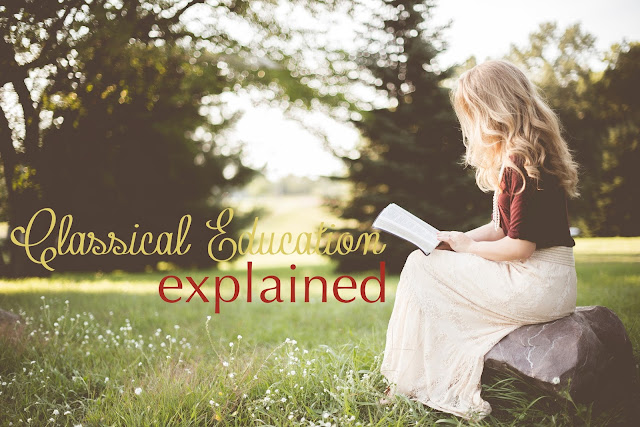You've heard me talk about how much I love it, but just what is classical education, anyway?
At its core, classical education is an approach that emphasizes not what to teach, but how to awaken the curiosity within ourselves that causes us to seek knowledge, chase wisdom and create beauty.
It begins with the premise that every child's mind is promising, fertile ground, especially when information is presented in a series of three developmental stages (referred to classically as the Trivium):
Grammar Stage (birth to approx. age 11): Children are naturally adept at memorization. During this phase, we plant seeds by singing, chanting, rhyming, drawing and developing the vocabulary (grammar) of a subject. In Classical Education, the greatest emphasis is not placed on developing skills such as writing or even reading (though, of course, those things happen during this time). This method assumes that a child's skills will develop naturally throughout his or her lifetime, and places instead an importance on growing factual knowledge during this window when the brain is particularly open to it.
Dialectic or Logic Stage (approximately ages 11-15): Having developed rich background knowledge on a variety of subjects, the early teenage student is naturally more argumentative and begins to link ideas together, question validity, and seeks to learn the "why" behind the "what" they've already come to know. In this stage, students are practicing reasoning, schooled in formal and informal logic, and learning to argue with wisdom and elegance.
Rhetoric Stage (ages 15-18 and beyond): As students gain greater independence and autonomy over their learning, we as educators begin to see the fruits of their study. They are equipped to be independent thinkers and communicators, employing rhetoric that is persuasive, factual and pleasing to listen to. They have gained mastery over wide variety of disciplines, and see the world not as a series of isolated subjects, but a tapestry of causes, effects and outcomes, powerfully - if often mysteriously -interwoven and worthy of careful consideration.
Why I like it.
I like it because it follows what I know to be true about the progression of cognitive development. As an educator, my Masters work was in neurological development, and I always struggled to reconcile what I knew to be true about the brain with what we consider to be "best practices" in the classroom.
That struggle is absent with classical education: Children are presented with concrete facts which build their academic schema; middle schoolers test and challenge their perceptions with analytical thinking; older students cement their education as they practice abstract thinking and articulation. In our world, with all its understanding of cognition from brain imaging, it is amazing to me that the methodology I find to work best was practiced for thousands of years, and has fallen out of vogue only recently in the midst of our modern, "progressive" era!
But -- there's more.
As my children grow in this environment, the pursuit of truth, goodness and beauty has woven itself into the very fabric of our family's culture. Our teachers are the likes of Lewis, Shakespeare, Ingalls-Wilder, Homer, Haydn and Monet. By virtue of our reformed education, we are able to commune with some of the great minds and talents and experiences history has to offer, until it becomes second nature to wonder, to enjoy, to discuss, to notice, to observe, and to find in one another kindred spirits whose souls are similarly awed, inspired and delighted by the journey.
Plus... We read.
Together. From great books. On every subject. Books that light up our minds and our souls alike. All the time.
We are not reading books merely to check off a list or to be able to say we have read them. We are reading to grow as persons, to know more that we may understand more, and ultimately, it is to be hoped, to act according to our great wisdom.
- Karen Glass, author and educator
Visions and ideals need a pathway; wisdom a road map. What we find buried in the pages of great literature is courage to inspire us, ideas to challenge us, and friends to come alongside us.
A rich inner life is developing here, day by day.
It cannot be measured or tested. It must instead be nurtured, inspired, and protected. It is like a fire whose embers are carefully fanned and tended lest they be squelched and allowed to go out. But, fed properly, the fire will grow into a strong and unquenchable flame that will carry them through the rest of their lives.
I don't share this to incite arguments. Neither do I wish to debate or belittle the merits of any other form of education. I share for two simple reasons: 1) I love the classical method (can you tell?!). When we love something and find it valuable, it is only natural to want to share it. 2) This is a form of education that, despite my MA in this very subject, I had never been exposed to.
There are so many great resources and ways to learn more! A small sampling (yes, several of these are Charlotte Mason. The more I learn, the more I am convinced that Charlotte's principles underscore and reinforce much of the classical methodology) is below.
It is a rabbit hole whose adventures you won't ever be sorry you embarked upon!
Books:
The Well Educated Mind by Susan Wise Bauer
The Core by Leigh Bortins
The Case for Classical Christian Education by Douglas Wilson
Educating the Whole Hearted Child by Clay Clarkson
A Philosophy of Education by Charlotte Mason
Podcasts:
Happy learning, friends!




No comments:
Post a Comment